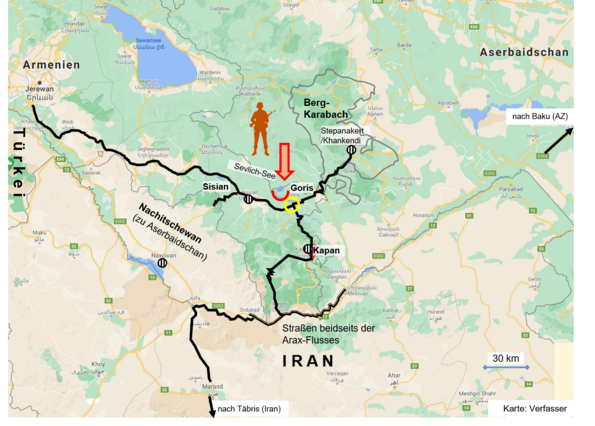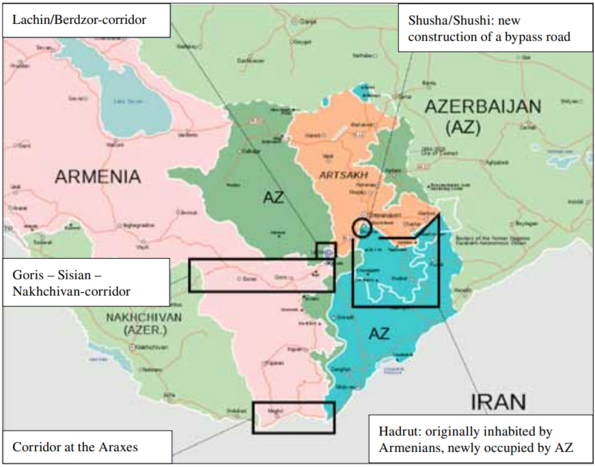Caviar and war in the Caucasus
Corruption and greed for power do not let the region come to rest
by Gerd Brenner, Oberst i Gst

This map also shows below the corridor along Armenia's southern border with Iran with two roads, one north and one south along the river Arax forming the border. (Artsakh = Arzakh = Nagorno-Karabakh)
It is not yet certain whether all the casualties of the war between Azerbaijan and Armenia last October have really been recovered and all the prisoners exchanged, but Azerbaijani ruler Ilham Aliyev is already making new demands. Now it is no longer a matter just of Nagorno-Karabakh, but about Armenia’s very existence.
In the war in Nagorno-Karabakh from 27 September to 10 November last year, probably more than 3,600 Armenians1 lost their lives. On the other side, one must add almost 2,900 Azerbaijanis2 as well as up to 500 Syrian mercenaries recruited by Turkey in Syria for the war against Nagorno-Karabakh. Most of them were probably Islamic extremists.3
As a result of the war, the Republic of Arzakh, as the internationally unrecognised republic in Nagorno-Karabakh calls itself, lost practically the southern half of its original territory. In the secessionist war from 1992 to 1994, Armenian and Karabakh fighters had occupied not only the heartland of Nagorno-Karabakh, but also surrounding areas indisputably belonging to Azerbaijan. These areas were important because they served as a land link between Nagorno-Karabakh and the Armenian motherland. In last autumn’s war, however, Azerbaijan did not content itself with reconquering its original territories, but also occupied parts of Hadrut province, which had already been part of Nagorno-Karabakh in Soviet times. This was a clear signal of contempt for the mainly Western states of the OSCE Minsk Group, which had laid down the modalities for resolving this territorial conflict in the so-called Madrid Principles.4 With Turkey behind him, Aliyev believes he can allow himself such behaviour.
As a result of the war, Nagorno-Karabakh is now surrounded by Azerbaijani territory on all sides. The only remaining land bridge to the Armenian motherland is the so-called Lachin corridor, which connects the capital Stepanakert (Khankendi in Azerbaijani) with the provincial town of Goris in the south of Armenia. The Nagorno-Karabakh Republic had to grant Azerbaijan transit rights between Azerbaijan and Nakhichevan in the ceasefire agreement of 9 November last year. People, goods and means of transport will be allowed to pass through this kind of corridor, under the supervision of Russian border troops. The most obvious option is to reopen the road and railway line in the Arax River valley on the southern border with Iran. However, the condition of these carriers of transport and the cost of restoring them are unclear. This corridor would also de facto be under the supervision of the Iranians, who can follow what is happening on the riverbank road from the Iranian southern bank, where a road also runs.
The success in last autumn’s war obviously went to Ilham Aliyev’s head: now he is also laying claim to a transit corridor in Syunik province in southern Armenia – claiming he will use force if necessary.5 As things stand, this can only mean that he wants to bring a corridor there under his military control. So far, the bellicose words of the strong man in Baku have hardly attracted any attention outside the South Caucasus region, and only the joint information platform of the BRICS countries has issued a statement yet.6
Now that the weather conditions allow military operations in the high mountains of the Caucasus again, Aliyev has followed up his words with deeds: On the morning of 12 May, Azerbaijani troops advanced to Sev Lich (literally: “black lake”) at 2,700 m above sea level on the border with Armenia, as well as to two adjacent dominant heights. That this is by no means only about securing the border is shown by the fact that by now at least 400 Azerbaijani soldiers are standing 3.5 km deep in Armenian territory.7 In high alpine terrain, this cannot be justified by navigational errors and inaccurate maps. One could safely dismiss this as high alpine sabre-rattling if Lake Sev itself were not the source of the Vararakn River, which flows through the provincial town of Goris. And Goris, in turn, is an important transport hub in this mountainous region, where the road from Yerevan branches out: South to the provincial capital Kapan and on to the border with Iran, East to the Lachin corridor and Stepanakert.
The occupation of Armenian territory at Lake Sev is interpreted by Armenia as a first step towards implementing Aliyev’s threats to force a transit corridor. This is quite understandable. The topography here only allows the route Lachin – Goris – Sisian – Nakhichevan. The implementation of these threats would have far-reaching consequences for the existence of the Armenian state. Aliyev would first have to justify why the corridor along the Arax River is not enough.
Caviar, football and screaming teenagers
Thanks to its wealth, Azerbaijan has been able to buy its way into the “European community of (shared) values” in recent decades. In an effort to ensure security of supply and diversify suppliers of oil and gas, European politicians have made repeated pilgrimages to Baku to strike lucrative deals with President Alyiev.8 Azerbaijan sees itself as holding a key role for oil exports from the Caspian Sea via non-Russian networks and as a hub for oil and gas from Kazakhstan and Turkmenistan to Europe.9 In the past, the legendary “caviar diplomacy” and poorly disguised bribery of Western politicians compensated for the lack of direct synergies of interest.10 Thanks to its good political and economic relations with Europe, Baku also managed to make itself the venue of the Eurovision Song Contest11 in 2012 and that European Football Championship which is about to begin.12
Azerbaijan’s main ally is Turkey. Its NATO membership means that Western military leaders still feel close to Turkey. For example, Turkey pushed through the shelving of Nato cooperation with Austria. Conversely, Austria complained about Turkish hacker attacks.13 Turkey is obviously dearer to the “Western community of values” than is Austria. In form of the refugee issue, Turkey has a lever in its hand that allows it to pressure the Europeans almost at will. The constant influx of refugees from Syria ensures that this lever will remain effective for the foreseeable future. On the other hand, the Europeans would in turn have to rely on cooperation with the unloved Russians and Iranians to settle the conflict in Syria. So here, too, the Europeans are caught between Scylla and Charybdis.
The role of Iran and Georgia
Armenia is one of the few countries that has been able to maintain good relations with Iran, which is all the more important for the small country because Armenia’s borders with Azerbaijan and Turkey are hermetically sealed. The Zurich Protocol on the Normalisation of Relations between Armenia and Turkey of 10 October 2009, which provided for the opening of the borders, was never implemented.14 The Armenian diaspora in Iran is accepted and the Armenian Orthodox Church enjoys some privileges in the Islamic theocracy.15 The stronger the tensions in the Persian Gulf become, the more Iran is interested in a calm situation in and around Armenia. An agreement in the dispute over the JCPOA nuclear deal would give Iran new freedom of action, which it could use to participate in efforts to resolve the Karabakh conflict. Consequently, Aliyev is currently under pressure.
In what way and to what extent Azerbaijan is able to motivate its northern neighbour Georgia to take an anti-Armenian stance remains to be seen. During the war last autumn, information circulated that Turkey was supplying Azerbaijan with weapons through Georgian territory. At the same time, anti-Armenian demonstrations took place in Georgia – rumoured to be organised by Azerbaijanis.16
And the West?
During last autumn’s war, the Armenians complained about the passivity of Russia and the West. Indeed, the US did nothing to stop Azerbaijan’s military aggression against Nagorno-Karabakh. Even now that President Aliyev has laid claim to Armenian territory in Syunik, nothing has been heard of US President Biden. Given Azerbaijan's heavy dependence on oil and gas exports, it would be quite easy to put the Aliyev regime in its place – if one wanted to. With regard to Turkey, the Americans seem to be more concerned about the purchase of Russian weapons than about its participation in military aggression.17 The US government has comforted the Armenians somewhat in recent weeks, as US President Joe Biden has used the term “genocide”. Whether this was more than a cosmetic use of the term remains to be seen.
By stationing border troops on the Turkish-Armenian border, Russia has long made it clear that a Turkish attack on Armenia would immediately escalate into a Turkish-Russian conflict. In the event of such a conflict, Turkey can hope for but little support from NATO. Rumours are currently circulating that Erdogan wants to motivate Azerbaijan and Ukraine to take coordinated action against Russia.18 It is not a rumour, however, that Turkish nationalists, including the “Grey Wolves”, are fighting on the side of Ukraine in the Donbass.19
With the stationing of a peacekeeping force in Nagorno-Karabakh, Russia has practically become the guarantor of the continued existence of the Republic of Arzakh. Russia has long tried to maintain good relations with Armenia and Azerbaijan, but is now forced by Aliyev’s claims in Syunik to take a clear position: now a non-member of the Collective Security Treaty Organisation CSTO is making claims on the territory of an ally, and these cannot be justified under international law. According to the international community, the Republic of Arzakh, is part of Azerbaijan under international law, and if Russia's intervention in favour of the Republic of Arzakh might have been interpreted as a breach of international law, the legal situation is clear in the case of Syunik. If Russia does not intervene there, the cohesion of the CSTO is gone. Through his military successes and Western passivity, Ilham Aliyev in Baku apparently sees himself in a position to trample on international agreements and threaten a sovereign country. If the West does not oppose such behaviour because it is not prepared to cooperate pragmatically with Russia and Iran, then it is to be hoped that it will at least give Russia a free hand to protect its ally from destruction. •
1 see https://www.eng.kavkaz-uzel.eu/articles/55023/
2 ibid.
3 see https://www.syriahr.com/en/188040/ and https://www.syriahr.com/en/194516/
4 on the Madrid Principles see https://css.ethz.ch/content/dam/ethz/special-interest/gess/cis/center-for-securities-studies/pdfs/CSS-Analysen_131-DE.pdf
5 see https://oc-media.org/aliyev-threatens-to-establish-corridor-in-armenia-by-force/, https://armenianweekly.com/2021/03/13/aliyev-once-again-threatens-armenia-with-war/, https://armenian.usc.edu/aliyev-makes-territorial-claims-on-armenia-yet-again/, https://www.azatutyun.am/a/31215235.html, https://www.civilnet.am/news/600496/aliyev-threatens-to-solve-the-meghri-corridor-issue-by-force-armenian-mfa-responds/?lang=en, https://jam-news.net/response-to-aliyevs-statements-claims-on-the-territory-of-armenia-yerevan-zangezur-syunik-sevan/
6 see https://infobrics.org/post/32936/
7 see https://www.fr.de/politik/rote-linien-am-schwarzen-see-90612220.html and https://www.faz.net/aktuell/politik/ausland/neue-spannungen-zwischen-armenien-und-aserbaidschan-17341621.html
8 see in the case of Switzerland: https://www.swissinfo.ch/ger/kaviar-diplomatie-schweiz-keine-korruption-stattdessen-kooperation/46545688
9 see https://eur-lex.europa.eu/legal-content/DE/TXT/?uri=CELEX:31999D0614. The basis for energy cooperation between the EU and Azerbaijan is the Energy Charter Treaty of 16 April 1998 and the assistance programmes based on it: TACIS (Technical Assistance for CIS), INOGATE (Interstate Oil and Gas Transport to Europe) and TRACECA (Transport Corridor Europe Caucasus Central Asia).
10 see https://www.handelsblatt.com/politik/international/korruption-wie-aserbaidschan-westliche-politiker-korrumpiert/27001696.html?ticket=ST-741635-XVIzrfjjObjBJgVaHMkq-ap3, https://www.welt.de/politik/ausland/plus228873279/Korruptionsaffaere-Wie-Aserbaidschan-deutsche-Politiker-umgarnt.html, https://www.transparency.de/aktuelles/detail/article/kaviardiplomatie-durch-aserbaidschan-betrifft-deutsche-politiker/
11 See https://www.hrw.org/de/news/2012/02/17/aserbaidschan-rechtswidrige-raumungen-im-vorfeld-des-eurovision-song-contest. https://www.dw.com/de/eurovision-und-menschenrechte-in-baku/a-15888936
12 See https://www.deutschlandfunk.de/em-spielort-aserbaidschan-baku-muesste-ausfallen.1346.de.html?dram:article_id=495897, https://www.watson.ch/sport/fussball/319736782-baku-auf-der-kippe-fussball-em-2021-mit-fans-in-den-stadien-geplant, https://www.fussball-wm.pro/em-2021/stadien-spielorte/nationalstadion-baku/
13 see https://www.derstandard.at/story/2000053273618/angriffe-auf-ministerien-bundesheer-enttarnte-tuerkischen-hacker aus dem Jahr 2017, s well as https://kurier.at/politik/inland/cyber-terrorist-nach-angriffen-auf-oesterreich-enttarnt/248.912.062, https://kurier.at/politik/inland/mutmasslicher-cyber-terrorist-ist-auf-dem-weg-in-die-tuerkei/249.110.096; on blocking cooperation: https://www.diepresse.com/5222874/turkei-blockiert-nato-kooperation-mit-osterreich and https://kurier.at/politik/ausland/tuerkei-blockiert-weiter-oesterreichs-nato-kooperation/311.430.787
14 see https://www.admin.ch/gov/de/start/dokumentation/medienmitteilungen.msg-id-29446.html and https://www.foraus.ch/posts/vom-stillen-tod-der-grossen-vertraege-was-ist-eigentlich-aus-den-zuercher-protokollen-geworden/
15 seehttps://horizonweekly.ca/en/81665-2/ and https://agbu.org/news-item/the-islamic-revolution-a-blessing-in-disguise-for-iranian-armenians/;; and even today the cooperation seems to work: It is possible that the Armenian airline Fly Armenia Airways has sold a Boeing 737 to the Iranian Caspian Airlines: https://www.aerotelegraph.com/iran-mysterioeser-flug-einer-armenischen-boeing-737
16 The Georgian government immediately denied such reports: https://dfwatch.net/clear-disinformation-georgia-denies-it-is-allowing-turkish-weapons-shipment-to-azerbaijan-54284.. See also https://oc-media.org/features/armenophobia-the-oldest-form-of-xenophobia-in-georgia/..
17 on the S-400s in Turkey, see https://anfdeutsch.com/aktuelles/us-sanktionen-gegen-turkei-treten-in-kraft-25498
18 see https://www.faz.net/aktuell/politik/ausland/tuerkei-und-ukraine-russland-als-gemeinsamer-gegner-17199135.html; and the arms trade also works: https://www.sueddeutsche.de/politik/ukraine-tuerkei-erdogan-1.5261283 and https://www.tagesschau.de/ausland/europa/ukraine-tuerkei-russland-101.html
19 see https://www.heise.de/tp/features/Graue-Woelfe-vor-der-Krim-3377105.html.
